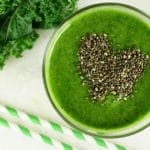Best Protein for Women
Protein in the past has been advertised as a macronutrient essential for men to get gains in the gym. This led to confusion for many women who questioned whether this macronutrient was important for women’s health also. Protein is just as important for men as it is for women and has many important functions. This includes allowing your muscles to build and repair themselves after a workout. Protein is also needed for an optimal immune system function as well as healthy hair and nails. When you have lean muscle mass this pulls on your bones when you move and therefore helps to keep your bones strong. (Shams-White MM et al, 2017) It is clear to see that women, just like men, need to include enough protein each day.
What is Protein?
Protein is one of the macronutrients that your body needs in large amounts to function and maintain health. Protein is made from amino acids, or the building blocks needed to make a protein. Your body can make almost all the amino acids needed to create a protein, except for 9 amino acids. These are called essential amino acids in which protein needs to get from your diet.
How Much Protein do Women Need?
If you are confused on where to start, a healthy woman needs around 10-35% of protein in her diet (Pesta DH et al, 2014 ). This can be between 0.8-1.6 grams per kilogram of body weight and up to 2g per kilogram during a heavy resistance training program. This means for a 60kg woman she will need around 48-96g protein per day.
The optimal amount of protein to include in each meal is between 20-40g. This means it is best to spread out your protein needs in meals and snacks.
Learn more about natural protein ingredients for women here.
Protein and Weight Loss
By eating enough protein, you will keep and build your lean muscle mass. Muscle burns calories even when you are resting and helps to increase your resting metabolic rate. This makes maintaining a healthy body weight easier. In addition to this benefit, protein also burns the greatest amount of energy when your body is processing it. This is called the thermic effect of food. Protein increases energy expenditure above your basal metabolic rate by around 15-30%. In comparison, carbohydrate increases your energy expenditure by approximately 5-10% and fat by around 0-3%. (Pesta DH et al, 2014 )
Protein also increases feelings of fullness. Research suggests that whey protein provides the most feeling of satiety, followed by casein and soy protein. (Veldhorst MA, 2009)
Protein Supplements
To achieve your daily protein needs a food first approach is recommended. Saying this, protein supplements can be included if desired to help meet your protein needs. Protein supplements are safe for women to use. For those who are competing in sport, it is recommended to select a brand which has been third party tested.
Protein supplements can provide your body with not only an optimal amount of complete protein but additional ingredients to support your health. For example, a whey protein blended with superfoods such as seeds generally provides your body with 22g of complete protein per serves as well as polyunsaturated and monounsaturated fats which are derived from the superfoods. These types of fats have many health benefits including supporting healthy cholesterol levels. This type of product also helps to meet your recommended dietary fibre needs to support bowel health, to keep you feeling fuller for longer and to help you to achieve and maintain a healthy weight.
If you are training multiple times a day, it is recommended to take a protein shake 30-60 minutes after your workout to optimise recovery. If not, research shows that by including adequate protein up to 24 hours post workout can support muscle recovery and syntheses. (Aragon AA et al, 2013)
Find out more about the best protein powder for women here.
Take home message: Gone are the days where protein was considered a masculine macronutrient. For women to achieve their health and performance goals achieving optimal protein each day is essential.
References:
- Veldhorst MA, Nieuwenhuizen AG, Hochstenbach-Waelen A, van Vught AJ, Westerterp KR, Engelen MP, Brummer RJ, Deutz NE, Westerterp-Plantenga MS. Dose-dependent satiating effect of whey relative to casein or soy. Physiol Behav. 2009 Mar 23;96(4-5):675-82. doi: 10.1016/j.physbeh.2009.01.004. PMID: 19385022.
- Pesta DH, Samuel VT. A high-protein diet for reducing body fat: mechanisms and possible caveats. Nutr Metab (Lond). 2014 Nov 19;11(1):53. doi: 10.1186/1743-7075-11-53. PMID: 25489333; PMCID: PMC4258944.
- Aragon AA, Schoenfeld BJ. Nutrient timing revisited: is there a post-exercise anabolic window? J Int Soc Sports Nutr. 2013 Jan 29;10(1):5. doi: 10.1186/1550-2783-10-5. PMID: 23360586; PMCID: PMC3577439.
- Shams-White MM, Chung M, Du M, Fu Z, Insogna KL, Karlsen MC, LeBoff MS, Shapses SA, Sackey J, Wallace TC, Weaver CM. Dietary protein and bone health: a systematic review and meta-analysis from the National Osteoporosis Foundation. Am J Clin Nutr. 2017 Jun;105(6):1528-1543. doi: 10.3945/ajcn.116.145110. Epub 2017 Apr 12. PMID: 28404575.







